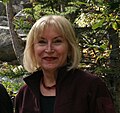Karla Poewe
Karla Poewe (born 25/1/1941) is an anthropologist turned [[historian]. She is the author of ten academic books and fifty peer reviewed articles in international journals.[1] Currently Karla is Professor Emeritus in Anthropology at the University of Calgary, Calgary, Alberta, Canada and Adjunct Research Professor at Liverpool Hope University, Liverpool, England. She is married to Irving Hexham and listed in the Canadian Who's Who[2]
Biography
Born 25 January 1941 in Königsberg, East Prussia, Karla became a refugee at the age of three after 189 Lancaster bombers from No. 5 Group of the British RAF dropped 480 tons of bombs on the city centre. From there her family were moved to a small estate in Poland, staying several weeks before being moved on. Almost six months later they found themselves in the vicinity of Dresden just in time for the bombing. From there they were moved to Plauen in Saxony and eventually spent three years in Werdau before walking over 250 miles, after the death of her father, to cross into the British Zone near Gottingen from where they went to the small town of Buxtehude. Her memories of this period were published as Childhood in Germany during World War II (1988).[3]
In 1955 Karla’s mother remarried and the family emigrated to Canada where Karla completed her high school at Parkdale Collegate in Toronto. After that she did several jobs before becoming an air hostess with Trans-Canada Airlines. After saving enough money for university she entered the University of Toronto where she was recognized as a top student in the days when students grades were posted by the university. Originally planning to study medicine she switched to Anthropology. After completing her B.A. she enrolled in a Ph.D. program at the University of New Mexico where Professor Harry Basehart was her thesis supervisor. There she met her first husband Bill Stuart.
Karla studied for a while with John Middleton at New York University and learnt Swahili at the University of Wisconsin-Madison. The fieldwork for her Ph.D. thesis was carried out in Zambia. After the completion of her thesis she taught for a year at the University of Toronto before moving to the University of Lethbridge in Alberta where she divorced. She then carried out further fieldwork funded by the Social Sciences and Humanities Research Council of Canada in Namibia. During this time she published her first book Matrilineal Ideology (1981) followed by the groundbreaking Reflections of a Woman Anthropologist (1982). This book which helped pioneer a new genre of anthropological writing was, at the publisher's insistence, published under the pseudonym Cesara, Manda.
After marrying Irving Hexham she wrote a book with him Understanding Cults and New Religions (1986). Later they also wrote New Religions as Global Cultures (1997). She also began fieldwork in South Africa where she studied the rise of Charismatic Christian Churches and the relationship of their members to apartheid. This work resulted in the publication of Charismatic Christianity as a Global Culture (1994).
This work came to an end in 1989 when a close friend the Rt. Rev. Londa Shembe the leader of one branch of the Zulu African Impendent Church the amaNazaretha was brutally assassinated and two other friends were killed in the ongoing violence. These tragedies caused Karla to redirect her research interests to looking at the role of missionaries in the areas of Africa where she had studied. Fortunately the fall of the Berlin Wall enabled her to freely access the archives of the Berlin Mission Society. During research in these archives in 1995 she discovered a large amount of material dealing with conflicts between members of the Berlin Mission and National Socialists.
This discovery led to a new project concerning the role of religions in the rise of National Socialism which took almost ten years to complete and resulted in her latest book New Religions and the Nazis (2006). An important discovery made during research for this book was the unexpected and close relationship between Protestant Liberal Theology and the ideology of National Socialism. Consequently, her recent work has important implications for Christian Apologetics and debates about the religious nature of Nazism and its relationship to Christianity-
Currently Karla is studying the treatment of German refugees following the end of World War II and is interested in the impact of defeat on the defeated. She is the author of ten books and has published over 50 academic articles.
Notes
- ^ A complete list of her academic publications and cv can be found on the University of Calgary Website at:*http://www.ucalgary.ca/~kpoewe/
- ^ Canadian Who's Who, Toronto, University of Toronto Press, 1996-2008
- ^ Karla Poewe, Childhood in Germany During World War II, Lewiston, Edwin Mellen Press, 1988
Works
- Matrilineal Ideology: Male Female Dynamics in Luapula, Zambia. London: Academic Press. 1981. Pp. 140.
- (under pseudonym Manda Cesare) Reflections of a Woman Anthropologist: No Hiding Place. London & New York: Academic Press. 1982. Pp. 234.
- The Namibian Herero: A History of Their Psychosocial Disintegration and Survival. Lewiston: Edwin Mellen Press. 1985. Pp. 364.
- (with Irving Hexham) Understanding Cults and New Religions. Grand Rapids: Eerdmans. 1986. Pp. 170.
- Childhood in Germany during World War II: The Story of a Little Girl. Lewiston: Edwin Mellen Press. 1988. Pp. 222.
- Religion, Kinship, and Economy in Luapula, Zambia. Lewiston: Edwin Mellen Press. 1989. Pp. 265.
- Charismatic Christianity as a Global Culture. Columbia, SC: University of South Carolina Press. 1994. Pp. 300.
- (with Irving Hexham) New Religions as Global Cultures: Making the Human Sacred. Boulder: Westview Press. 1997. Pp. 194.
- New Religions and the Nazis, Oxford, Routledge. 2006. Pp. 218.

